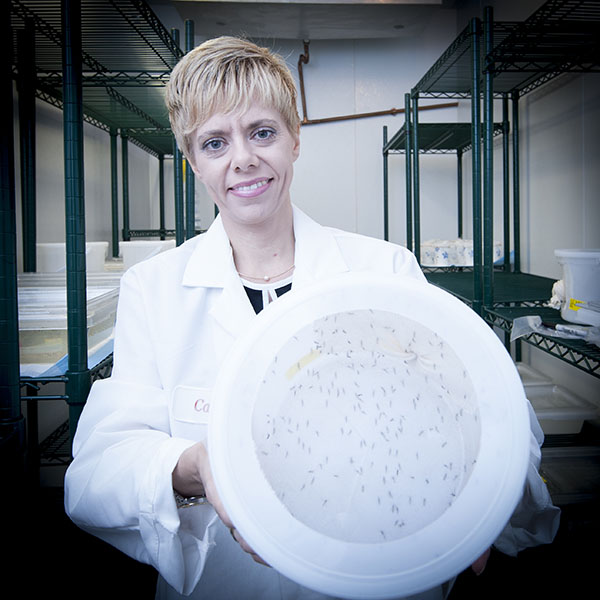September 27, 2016
Medical entomologist: 'Game of Thrones' offers parallels to new global era of infectious disease
 As we enter a global era of infectious diseases, finding new antibiotics and pesticides is increasingly imperative, says vector biologist Cate Hill. (Purdue University/Vincent Walter)
Download image
As we enter a global era of infectious diseases, finding new antibiotics and pesticides is increasingly imperative, says vector biologist Cate Hill. (Purdue University/Vincent Walter)
Download image
WEST LAFAYETTE, Ind. - Infectious diseases and the insects that transmit them have been powerful forces in shaping human history and evolution. The writings of the ancient Egyptians, Greeks and Romans tell of mosquito-borne illnesses; plagues of epic proportions wiped out half the population of Europe in the Middle Ages; and waves of dengue, yellow fever and malaria shaped the United States.
For the past 60 years, however, the developed world has enjoyed a rare break from many of these diseases. Modern medicine and insecticides have made these illnesses seem like distant memories to many nations, legendary foes from a long-ago past.
But according to Cate Hill, Purdue University medical entomologist and avid fan of the fantasy book and television series "Game of Thrones," this condition is not the new normal. Rather, it's a brief and privileged respite - and it's not likely to last. Winter is coming.
"We've co-evolved with pathogens," she says. "It's only recently and in the developed world that we have lived relatively free of infectious diseases, and I would suggest we're moving into an era where that is not the case anymore. These diseases are increasingly going to become a problem for people everywhere."
Overuse of antibiotics and insecticides has led to the rise of drug-resistant pathogens and the emergence of mosquitoes that can withstand conventional pesticides, a "double whammy," Hill says. In addition to the resurgence of diseases previously controlled with antibiotics, we face an onslaught of emerging mosquito-borne viruses such as Zika and chikungunya.
"We've found all the obvious drugs and pesticides," she says. "Now it's increasingly difficult to find replacement products. Our toolkit is looking a bit bare."
Hill sees "Game of Thrones" as a fitting parallel for the story of infectious diseases throughout human evolutionary history.
"'Game of Thrones' tells the story of the never-ending struggle of life. Either you win or you die. That's what happens with infectious diseases."
In the series, leaders in the land of Westeros jockey for power while on the harsh outskirts of the region a ragtag group of defenders known as the Night's Watch struggle to fight off a mounting incursion of White Walkers, a supernatural race of icy-eyed monsters.
"Our White Walkers are not monsters but mosquitoes, fairly tiny organisms," Hill says. "Their weapons are not swords of ice but viruses and other pathogens. Our ability to defend ourselves against these enemies is weakening, and - in another interesting parallel with "Game of Thrones" - a key portion of the political and economic powerbase is not paying attention to the threat."
The Night's Watch lucks into a stash of dragon glass, magical weapons that prove an effective defense against the White Walkers.
But, as Hill points out, the quantity is limited.
As our medical and chemical resources for battling mosquito-borne diseases dwindle, it is imperative that we find new sources of "dragon glass," she says.
Could genetically modified mosquitoes be the answer? A Zika vaccine? What if we could eliminate mosquitoes altogether - and if we could, should we?
"We've grown very complacent about these diseases in the Western hemisphere," she says. "We need to be continually looking for the next dragon glass. The minute we stop our search or are unsuccessful, it could be the last page of our saga."
Hill will explore these questions and challenges in an interactive discussion called "Infectious Diseases and the Game of Thrones: Can new technologies prevent epidemics of mosquito-borne diseases?" during the Purdue Dawn or Doom: Future Technology Risks and Rewards conference.
The conference, Oct. 3-4 on the Purdue West Lafayette campus, is free and open to the public. Hill's talk is from 11:30 a.m. to 12:30 p.m. Oct. 4 in Room 206 of Stewart Center.
Writer: Natalie van Hoose, 765-496-2050, nvanhoos@purdue.edu
Source: Catherine Hill, 765-496-6157, hillca@purdue.edu

